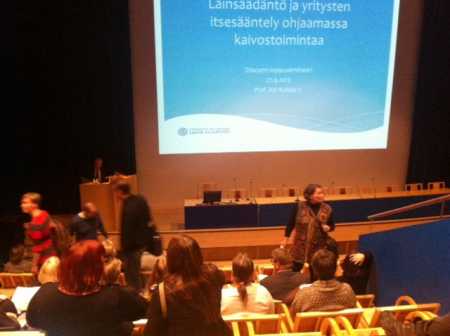
FTimes Photo
Mining industries should consider social impact, social regulations and environmental aspect before, during and after mining periods, a research as part of a project said.
Most of the residents of three northern localities — Kittilä, Kolari and Muonio — think that mines in their areas brought about significant development in their lives, according to the research report.
The findings of the research as part of the project called “The mines, land use and local communities (DILACOMI)” were disclosed at seminar at the Polarium Hall in Arctikum on 27 September.
DILACOMI project has, however, identified the conditions that can support more socially sustainable mining operation in Lapland in Finland and elsewhere.
The final seminar of the project also published the results as a guidebook titled “Good Mining in the North: A Guide to the Regulation of Environmental and Social Sustainability in Support of Best Practices.”
DILACOMI is a joint research project of the University of Lapland, the University of Oulu, and the Finnish Forest Research Institute (Metla).
The project, with funding granted from the ERDF, focuses on the acceptability of mining in local communities, the combining of mining and nature-based livelihoods, and the views of tourists on mining.
Professor Kai Kokko of the University of Lapland who led the three-year project told Finland Times, “the project results show that the mines are not necessarily in conflict with nature-based tourism. Anyway, the careful assessment and consideration is needed to balance the interests of both industry,” adding, “the project results give based on empirical studies from two mining projects and other research work recommendations for good practice in mining as well as potential ideas how to improve it with a self-regulation over the minimum level of legislation.”
The authority and mining industries need to consider social impacts, social regulations and environmental changes before and during the mining period and after closing the mine. “We found in our research that the valid information about local communities, the social impact assessment and the social licence are together relevant when taking steps towards socially sustainable mining”, he added.
A key element of the research is the mining towns, expectations of local communities in mining point as well as coordination with other mining industries in the region, such as tourism and reindeer herding.
International comparisons and legislation have been identified by studying the best practices and policies that promote the social acceptability of mining activities in local communities.
According to researchers, the actual services in mining, the environment and the social impact assessment should be carried out at regular intervals even in the mine closure phase as the evidence shows that social impact assessment and the importance of the environmental impact assessment at a later authorisation process are inadequate.
Leena Soudunsaari, a researcher from the University of Oulu, says, “Mining and its impacts related to land use planning should be understood as part of a strategic and comprehensive land use planning, particularly by the municipality.”
Apparently, people of northern Finland have been worried for long about risks of mining in terms of the environment and tourism and estimations on the negative effects concern such as the state of waterways, traffic safety, and reindeer husbandry.
Residents from mining areas, however, anticipated jobs and positive economic effects at the local level and the researchers believe that the guidebook and its practices would ease the concern of the communities.